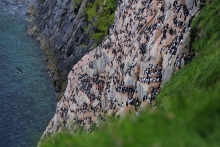
If you’ve ever seen a starling peck open a garbage bag or a grackle steal your dog pellets, you get a sense that some birds have learned to take advantage of new feeding opportunities – a clear sign of their intelligence. Scientists have long wondered why certain species of birds are more innovative than others, and whether these capacities stem from larger brains (which intuitively seems likely) or from a greater number of neurons in specific areas of the brain.

The Arctic is warming at approximately twice the global rate. A new study led by researchers from McGill University finds that cold-adapted Arctic species, like the thick-billed murre, are especially vulnerable to heat stress caused by climate change.
“We discovered that murres have the lowest cooling efficiency ever reported in birds, which means they have an extremely poor ability to dissipate or lose heat,” says lead author Emily Choy, a Postdoctoral Fellow in the Natural Resource Sciences Department at McGill University.

Migratory waterbirds are particularly exposed to the effects of climate change at their breeding areas in the High Arctic and in Africa, according to a new study published in Bird Conservation International.

Muscle structure and body size predict the athletic performance of Olympic athletes, such as sprinters. The same, it appears, is true of wild seabirds that can commute hundreds of kilometres a day to find food, according to a recent paper by scientists from McGill and Colgate universities published in the Journal of Experimental Biology.

Despite having bat-like wings, two small dinosaurs, Yi and Ambopteryx, struggled to fly, only managing to glide clumsily between the trees where they lived, according to a new study led by an international team of researchers, including McGill University Professor Hans Larsson. Unable to compete with other tree-dwelling dinosaurs and early birds, they went extinct after just a few million years.
Biologists now have a better idea of the origin of birds and the evolution of flight, two iconic events in the history of life on earth, thanks to work by a group of international scientists including a McGill professor. In updating the evolutionary tree, the team’s findings show some dinosaurs could fly before they evolved into birds, and many others were experimenting with powered flight.

There’s less ice, more capelin and lots of hungry polar bears
Climate change in the eastern Arctic has already altered the travel, diet and safety of some of the most numerous birds in the circumpolar world: thick-billed murres, known as akpait in Inuktitut.
These and other changes are likely to continue, says Allison Patterson, a McGill University graduate student [with Professor Kyle Elliott] who has tracked the habits of these black-and-white birds on Hudson Bay’s Coats Island, known as Akpatordjuark in Inuktitut.

Now, a new study has found that birds that are able to change their behavior in this way are less likely to become extinct than those that do not adapt.

Bird species that have the capacity to express novel foraging behaviors are less vulnerable to extinction than species that do not, according to a collaborative study involving McGill University and CREAF Barcelona and published today in Nature Ecology & Evolution.

Once prevalent in Montreal, the littlest falcon's downfall is a bellwether for hard times. “The story of the kestrel is happening to other bird species.”
Throughout the 1900s, North America’s littlest falcon was also described as the continent’s most common and widespread. Small but fierce and marked with bright plumage rare in the raptor world, the American kestrel could be seen throughout the continent, diving and swooping in fallow fields or under the stadium lights at baseball games, hunting for plump moths or small mice.
OpEd by Emeritus Professor David Bird:
David M. Bird is an emeritus professor of wildlife biology at McGill University who has studied birds for five decades.
When I read the recent headlines that North America has lost nearly three billion birds over just the past five decades, I was not surprised. But I must admit it did depress me to a degree. That’s a lot of birds!

Wild birds that are more clever than others at foraging for food have different levels of a neurotransmitter receptor that has been linked with intelligence in humans, according to a study led by McGill University researchers. The findings could provide insight into the evolutionary mechanisms affecting cognitive traits in a range of animals.
The study, published in Science Advances, was conducted by McGill biologists Jean-Nicolas Audet and Louis Lefebvre, in collaboration with researchers from Duke and Harvard universities.
Barbados birds
Conducting a bird census by foot can also be disruptive, David Bird, an emeritus professor of wildlife biology at McGill University, told Popular Science. “While you’re doing that, you’re disturbing the hell out of the birds,” Bird said.
